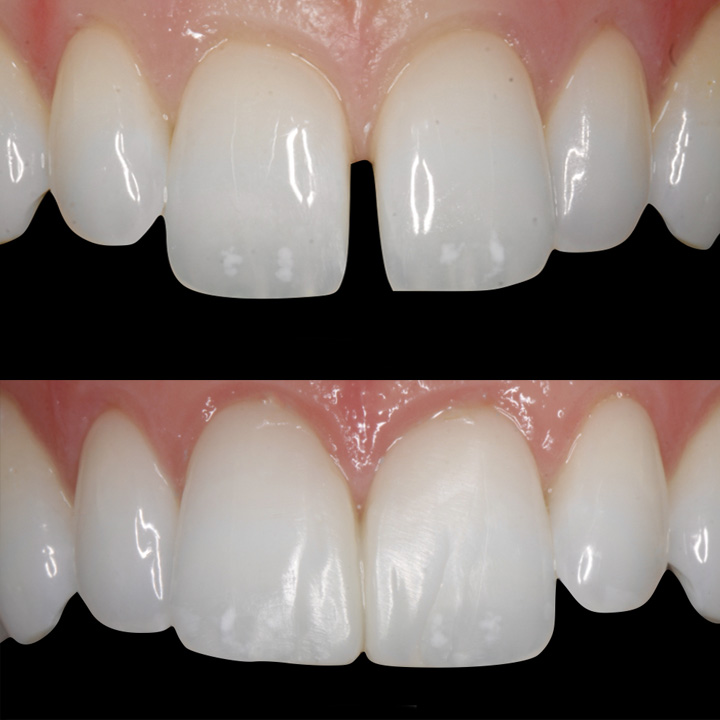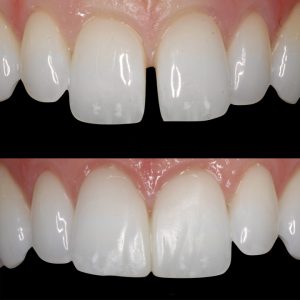
What is composite bonding?
We get asked frequently at FHDC, “what is composite bonding?” Dental composite bonding treatment, also known as composite bonding, dental bonding or tooth bonding, is a cosmetic dental procedure used to improve the appearance of teeth.
It involves the application of a tooth coloured composite dental material to the surface of the teeth to correct dental imperfections. This can help change the shape, size and colour of the teeth.
During a composite bonding dental procedure, your dentist prepares the tooth by lightly etching its surface to create a rough texture. This enables the bonding material to fix to the tooth.
Your dentist then applies the composite resin material to the tooth. They will carefully sculpt and shape the materials to achieve the desired results.
Not only is this a technical dental skill, it also requires a high level of artistic talent by your dentist. Detail is vital and it is important not to rush the treatment.
The composite resin is colour matched to the natural shade of you tooth. If done correctly, this can provide a natural looking tooth where it is virtually impossible to see the composite material.
Once the desired shape and size have been achieved, your dentist will use a special curing light to harden and set the composite resin. Once hardened, your dentist will trim and polish the bonded tooth to blend it seamlessly with the surrounding teeth.
What is composite bonding used for?
Composite bonding is used by competent dentists to solve various cosmetic dental problems. These can include…
- Repairing teeth that are chipped or cracked.
- Gap closure between teeth (diastema treatment).
- Correcting staining and discolouration
- Changing the size and shape of irregular shaped teeth.
- Covering exposed tooth roots due to gum recession.

How long does composite bonding take?
When compared to other dental treatments, composite bonding is a relatively quick and cost effective. It is also less invasive than other treatments including porcelain veneers and dental crowns which can require some filing of health tooth.
As the dental treatment doesn’t require laboratory work in comparison to say a dental crown or dental veneer, treatment time is really only dependent on the time required by your dentist to carry out the treatment.
One caveat to this is if you would like teeth whitening before bonding treatment. This has to be carried out in advance of the composite bonding, as the composite material has to be shade matched to the colour of your teeth. Bonding material colour cannot be altered with teeth whitening materials.
How long does composite bonding last?
How long composite bonding lasts is down to several factors. These include the physiology of your natural teeth, your age, your diet, smoking & vaping habits and wear and tear. Many of these factors can be reduced by a thorough every day dental routine.
Over time natural tooth surfaces which are porous, will discolour. This mean that your teeth may darken or yellow when compared to the composite material. Composite resin material used in bonding is not as durable or stain-resistant as porcelain used in a dental crown or veneer may also change colour over time, at a slightly different level to your natural tooth.
Teeth whitening may be used to try and restore a whiter colour of your natural teeth, or you may choose to replace the composite bonding material after teeth whitening.
If you are considering composite bonding or any other dental procedure, it is best to book a consultation with an experienced dentist who will evaluate your specific needs and provide a personal treatment plan.
How much is composite bonding?
It isn’t possible to provide a one size fits all price for composite bonding. It really is dependent on the complexity of an individual case and what exactly is required and how much time is required by your dentist to provide your bespoke composite bonding treatment.
It is best to book a dental consultation and have a thorough dental examination and conversation with your dentist who will create your personal dental treatment plan.
We hope that this has helped answer “what is composite bonding?” If you would like to talk to a dentist at Far Headingley Dental Care about composite bonding or any other cosmetic dentistry, please book a new patient consultation here.
Alternatively if you can call the practice on 0113 275 1323 during normal opening hours.








